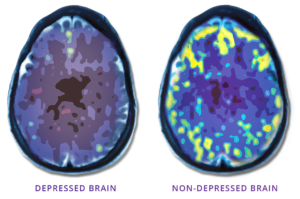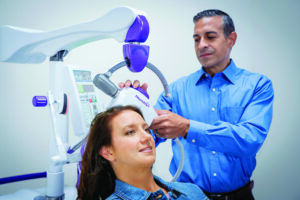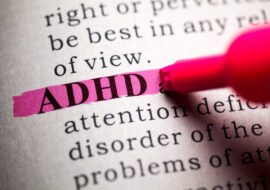Neurostar Transcranial Magnetic Stimulation
Anderson Wellness is proud to offer Neurostar Transcranial Magnetic Stimulation (TMS) therapy, an FDA-approved, non-invasive, drug-free treatment that can be highly effective for patients who have not responded to standard treatments for major depression.
What is TMS?
There are specific areas in the brain that control your mood. When synapses in these mood-regulating areas are under-active, connections are broken – and depression can result.
While standard medical treatments for depression are commonly centered around antidepressants – which rely on the systems in your body to deliver relief and come with potential side-effects – TMS treatments go straight to the source of depression: your brain.
TMS applies a series of short magnetic pulses that stimulate nerve cells in areas of the brain known to be associated with major depression. These magnetic pulses induce small electric currents which change the firing patterns of neurons, altering dysfunctional brain patterns associated with depression.

Simply put, TMS revitalizes dormant synapses, “waking up” your brain to function as it was meant to.
TMS is not a drug, surgery, or “shock” therapy – and because it doesn’t go through the digestive system or affect other areas of the body, it has none of the systemic side effects of antidepressant drugs.
It is simply a safe, effective treatment for MDD, without the side effects of medication.
How does TMS work?
TMS is a noninvasive, outpatient treatment that takes as little as 19 minutes per day*.
During each session, NeuroStar’s unique “figure-8” coil is placed precisely against the head, as magnetic pulses deliver therapy to the correct mood-regulating areas of the brain. NeuroStar’s patented Contact Sensing technology ensures the prescribed dosage – every treatment, every pulse.
You will be awake and alert for each treatment and may resume regular activities immediately afterward. Some patients feel a tapping, tingling, or warming sensation where the coil is positioned, which is usually temporary, and subsides with further treatments.

TMS treatment requires around 36 sessions, every day, over the course of 5-6 weeks. Some treatment durations may vary depending on your provider’s recommendation.
Most insurance plans include TMS treatments.
For more information or to schedule a free TMS consultation call our office.



